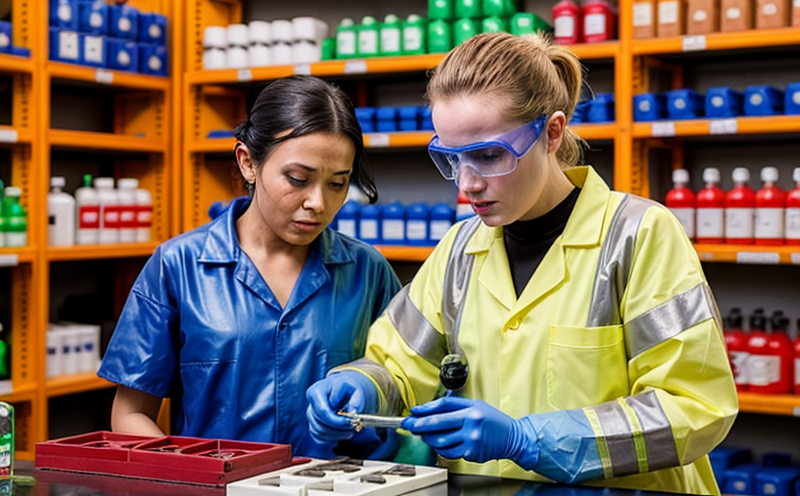ISO 19040 Endocrine Disruptor Chemical Testing in Trade Products
The International Organization for Standardization (ISO) has established ISO 19040 as a crucial standard for identifying endocrine disruptors in trade products. This service ensures that chemical substances do not pose adverse effects on the endocrine system, which is responsible for regulating various physiological processes such as growth and development, metabolism, sexual function, and reproduction.
The significance of this test cannot be overstated, especially in sectors like pharmaceuticals, agrochemicals, and consumer products. Endocrine disruptors can mimic or interfere with natural hormones, leading to health risks for consumers and the environment. This testing service aims to protect public health by ensuring that trade products meet stringent safety standards.
Our laboratory adheres strictly to ISO 19040 guidelines, using cutting-edge analytical techniques such as liquid chromatography-tandem mass spectrometry (LC-MS/MS) and gas chromatography-mass spectrometry (GC-MS). These methods provide high sensitivity and selectivity for detecting even trace amounts of endocrine disruptors. Our team of experts is well-equipped to handle a wide range of samples, including pharmaceuticals, pesticides, cosmetics, and food additives.
The testing process involves several critical steps: sample collection, extraction, purification, concentration, and analysis. Each step requires precision and attention to detail. For instance, the correct sampling technique ensures that representative specimens are collected from the trade product under scrutiny. Extraction methods vary depending on the nature of the substance being tested; however, they typically involve solvents like methanol or acetonitrile.
Purification is essential to remove any interfering components before analysis. This step often uses techniques such as solid-phase extraction (SPE) or liquid-liquid extraction (LLE). After purification, the sample is concentrated using evaporation or distillation methods prior to injection into the chromatography instrument. Chromatographic separation allows for effective identification and quantification of endocrine disruptors present in the sample.
Once testing is complete, results are interpreted according to ISO 19040 criteria. Compliance with these standards indicates that a product has been tested thoroughly and does not contain harmful levels of known or suspected endocrine disruptors. Reporting follows clear guidelines set forth by international organizations like the World Health Organization (WHO).
This service plays an integral role in ensuring global trade compliance, particularly for countries adhering to regulations such as REACH (Registration, Evaluation, Authorisation and Restriction of Chemicals) within the European Union or TSCA (Toxic Substances Control Act) in the United States. By providing accurate, reliable data on potential endocrine disruptors in traded goods, our laboratory supports informed decision-making processes across various industries.
Our clients include large corporations specializing in pharmaceuticals, agrochemicals, and personal care products as well as smaller businesses looking to ensure their products comply with international standards. With ISO 19040 certification, companies can gain competitive advantages by demonstrating their commitment to quality and safety while also reducing legal risks associated with non-compliance.
Our laboratory has extensive experience in performing this type of testing across diverse sectors including healthcare, agriculture, cosmetics, and food processing. We understand the importance of accurate results for our clients' reputation and success. Our goal is not only to provide reliable data but also to offer valuable insights into how companies can improve their products or processes.
Scope and Methodology
| Aspect | Description |
|---|---|
| Sample Preparation | Involves collection, extraction, purification, concentration, and analysis. |
| Instrumentation Used | Liquid Chromatography-Tandem Mass Spectrometry (LC-MS/MS) and Gas Chromatography-Mass Spectrometry (GC-MS). |
| Data Interpretation | According to ISO 19040 criteria, ensuring compliance with international standards. |
| Aspect | Description |
|---|---|
| Sample Collection | Representative specimens are collected from trade products under scrutiny. |
| Extraction Methods | Vary depending on the nature of the substance being tested; common methods include methanol or acetonitrile extraction. |
| Purification Techniques | Solid-phase extraction (SPE) and liquid-liquid extraction (LLE). |
Why Choose This Test
The ISO 19040 Endocrine Disruptor Chemical Testing in Trade Products service is essential for several reasons. Firstly, it helps companies comply with regulatory requirements worldwide by ensuring their products do not contain harmful levels of endocrine disruptors. This compliance can prevent costly fines and penalties associated with non-compliance.
Secondly, this testing service enhances brand reputation through transparency regarding product safety. Consumers increasingly demand information about the ingredients used in goods they purchase; being able to demonstrate adherence to strict testing protocols reassures customers that your company prioritizes their health and well-being.
A third benefit lies in risk management. By identifying potential issues early on, companies can take proactive measures to address them before they escalate into larger problems. This could involve reformulating products or sourcing alternative ingredients altogether.
Finally, this service supports innovation by providing valuable insights into product performance and safety. Understanding the presence of endocrine disruptors allows manufacturers to develop safer alternatives that meet both current standards and future expectations.
Customer Impact and Satisfaction
Our customers appreciate our ISO 19040 Endocrine Disruptor Chemical Testing service for several reasons. One key benefit is the peace of mind that comes from knowing their products are rigorously tested according to international standards.
Another advantage is reduced risk exposure, both legally and commercially speaking. Non-compliance with regulations can lead to significant financial losses due to product recalls or lawsuits. By partnering with us, customers minimize these risks while maintaining a strong market position.
The service also contributes positively to stakeholder relationships by fostering trust among consumers, employees, investors, and other stakeholders who value sustainability and ethical practices.





